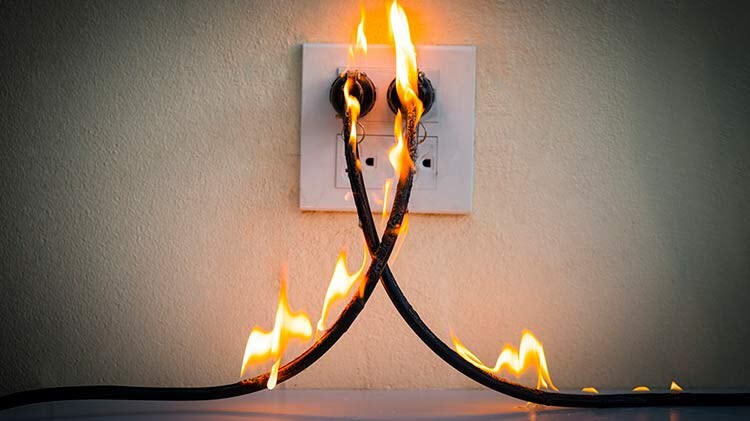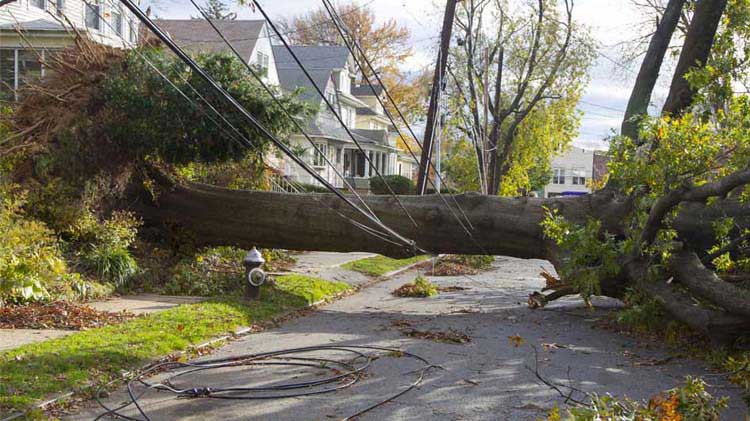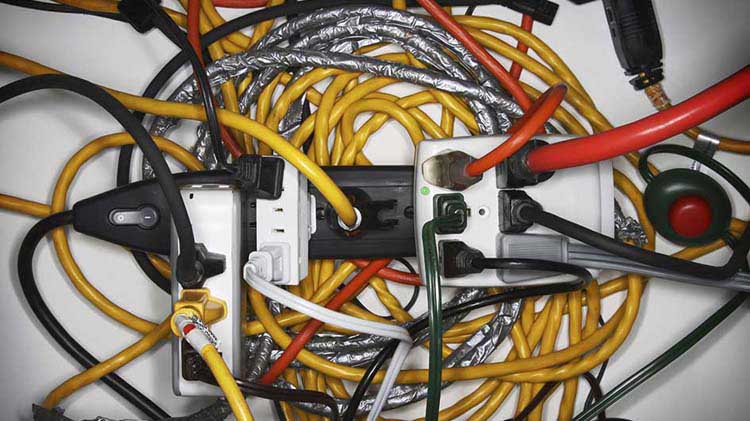Be aware of electrical hazards in your home
What are some different residential electrical hazards?
Don't underestimate common household currents — they can cause injury and even be fatal. Electrical equipment should be treated with respect and properly maintained to help reduce the chance of physical harm or property damage. The following electrical safety tips may help you recognize potential hazards.
Common residential electrical hazards
Arc faults
- An arc (similar to an electrical short) produces intensely hot sparks, also known as an arc flash that can set fire to nearby combustible materials.
- They often happen in appliance or extension cords that have become frayed or cracked.
- To help prevent arc faults, consider having Arc Fault Circuit Interrupters (AFCIs) installed in your home. These devices look and work like conventional circuit breakers. When an AFCI breaker trips, have an electrician determine the cause and fix it.
Service entrance lines
- Use caution around overhead lines that deliver power to your home. Contact with power lines by objects such as ladders or a child's kite could result in electrocutions.
- Contact your utility company before digging around underground service lines.
- Pay attention to the condition of your entrance cables. Take note of any damaged insulation, as aging service entrance cables can arc when old insulation cracks. This could electrify metal portions of the system, creating electrocution hazards.
Fuse and circuit breaker boxes
- Fuses or circuit breakers should be enclosed in a panel box. Interior wiring should never be visible. Always keep the panel door closed and latched.
- Keep the area around the electrical panel free of combustible materials.
- If you notice burn marks, hear buzzing or cracking, or smell burning plastic around or inside the electrical panel, have a qualified electrician check the panel immediately.
- If you have a fuse box, keep spare fuses of the proper size for the circuit they protect. Over fusing presents a severe fire hazard as circuit wires can overheat when they carry more current than intended.
- When older screw-in fuses require replacement, consider having a qualified electrician install Type S (also known as tamper-proof) fuses.
- If fuses blow or circuit breakers trip frequently, it may be an indication that the circuits are overloaded. Have a qualified electrician inspect the system and make the appropriate repairs or upgrades.
Wiring
- Wiring that is damaged, corroded or worn may cause problems including arc faults, electrical shocks and fires. Defective wiring should be replaced promptly to help prevent significant electrical hazards.
- If the wiring in your home hasn’t been replaced in over thirty years, you may want to consider having an electrician inspect it to determine if it needs to be replaced. In addition to possibly having degraded insulation, cracking and heat damage, outdated wiring may not be equipped to meet current standards and should be replaced accordingly.
How to help improve electrical safety in your home
Monitor your home's electrical network
By plugging in a smart sensor, you can monitor your home's electrical network. These sensors help to identify potential electrical hazards and send you an alert. State Farm® is offering the Ting smart sensor, in limited quantities, to eligible State Farm non-tenant homeowner policyholders in participating states.
Electrical cords
- Extension cords are a temporary, not a permanent, wiring solution.
- Grasp the plug — not the cord — when removing cords from outlets.
- Avoid overheating by using extension cords of the proper size for the load they will carry and by using cords as short as possible.
- Regularly check cords for damage — and do not splice cords together in an attempt to repair them..
- Cords should not be placed under rugs or otherwise covered since this may result in overheating or fraying. Rolling or looping cords into a bundle may also cause overheating.
- Avoid using "octopus plugs", which allow many cords to be plugged into a single receptacle.
Receptacles and switches
- See that receptacle and switch covers are securely fastened. Exposed wiring presents a serious shock hazard.
- Have a qualified electrician inspect any receptacle or switch that sparks, makes unusual noises or smells like it is burning.
- Protect outside receptacles with weatherproof covers and Ground Fault Circuit Interrupters (GFCIs).
- Replace receptacles that will not hold plugs firmly.
- Replace aging push-button or twist switches.
- Install tamper-resistant outlets or tamper-resistant outlet covers where small children are present.
Electrical appliances and tools
- Do not use light bulbs with a higher wattage rating than recommended on the fixture.
- Keep appliances and their power cords away from any water or moisture.
- Hire a qualified electrician to replace two-prong outlets with three-prong (grounded) outlets. Never remove the grounding prong on an appliance cord.
- Keep electric heaters clear of combustible material such as drapes, bedding, furniture and papers.
- Unplug any appliance or tool that gives even the slightest shock (i.e., tingling sensation), and have it checked by a qualified electrician.
Get plugged into electrical safety
Consider taking the basic preventative steps outlined here, and print or bookmark this page for future reference. Just by being aware of common electrical hazards and keeping an eye out for problems, you may help prevent serious damage to your home and possessions.
For more information, check out Lightning Protection Institute, Underwriters Laboratories and Electrical Safety Foundation International (ESFI). You can also learn more about protecting your home when lightning strikes.
Contact a State Farm agent with questions about how homeowners or renters insurance may cover property loss.




